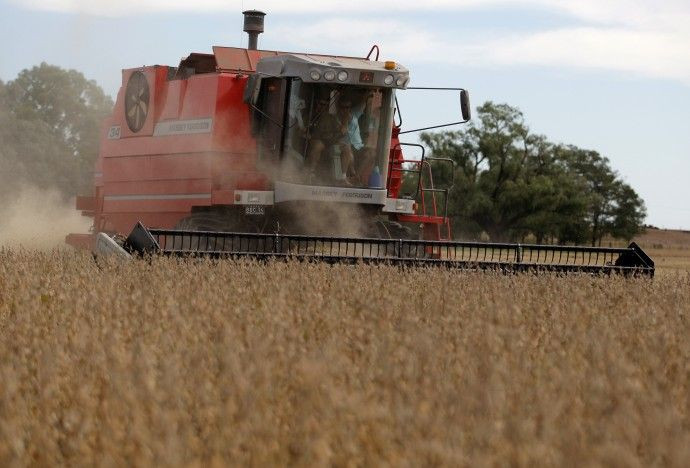China Retaliates To Trump's New Tariffs, Suspends Purchases Of Agricultural Products

Wall Street is expected to take another pounding Tuesday after China made the not unexpected announcement it will no longer purchase U.S. agricultural products in retaliation to president Donald Trump’s new 10% tariffs on Chinese exports to the U.S. starting Sept. 1.
China also isn’t ruling out new tariffs against U.S. agricultural products purchased after Aug. 3.
Stock futures fell Monday, implying a 480 point drop or higher might be in the cards for Tuesday.
China’s Ministry of Commerce said Chinese companies have stopped buying U.S. agricultural products due to Trump’s 10% tariffs on $300 billion worth of Chinese goods. Beijing has also ordered its state-owned enterprises (SOEs), which account for the bulk of agricultural purchases, to stop buying U.S. produce.
“This is a serious violation of the meeting between the heads of state of China and the United States,” said commerce minister Zhang San about the 10% tariffs.
The meeting Zhong was referring to was the one between Trump and Chinese president Xi Jinping at the G20 summit in Buenos Aires in December 2018. Beijing is said to have committed to import at least 20 million metric tons of U.S. soybeans in exchange for Trump holding off on new tariffs.
China’s announcement it will stop buying U.S. soybeans “is a body blow to thousands of farmers and ranchers who are already struggling to get by,” said Zippy Duvall, president of the American Farm Bureau Federation.
Beijing has resorted to one-off deals on several occasions to purchase U.S. agricultural products as gestures of goodwill and to keep its word to Trump. In June, China agreed to buy 544,000 metric tons of soybeans from the U.S. worth $200 million.
China was once one of the largest buyers of U.S. agricultural produce but Russia is now taking its place. The commerce ministry last week announced it will “expand soybean imports from Russia”.
“China has already become the biggest destination for Russian agricultural exports,” said the commerce ministry in a statement. “Next, China is willing to work together with Russia to steadily expand market access and continuously improve the level of ease of bilateral trade.”
Chinese soybean buyers have also been increasing orders from Australia and Brazil. Chinese futures for imported soybeans rose to the daily increase limit on Monday, up 3.98 percent to $456 a tonne.
U.S. farmers remain the hardest hit by Trump’s trade war against China. Trump, however, refuses to accept this reality and continues to defend that tariffs are being paid for by China and not by American farmers, who sell a lot less, and consumers who pay higher prices.
“Based on the historic currency manipulation by China, it is now even more obvious to everyone that Americans are not paying for the Tariffs -- they are being paid for compliments of China, and the U.S. is taking in tens of Billions of Dollars!,” tweeted Trump on Monday.
Before Trump sprang his trade war on China in June 2018, China was the largest importer of U.S. soybeans. It bought from 25 to 30 million tonnes a year. U.S. soybeans sales to China have since evaporated.
Since the start of the U.S. crop year in September, China has agreed to buy only 14 million tonnes, of which 10 million has been shipped. The U.S. delivered only 5.3 million tonnes of soybeans to China in the first five months of this year compared to 15.2 million tonnes in the first five months of 2018, before Trump ignited his trade war.
© Copyright IBTimes 2024. All rights reserved.





















